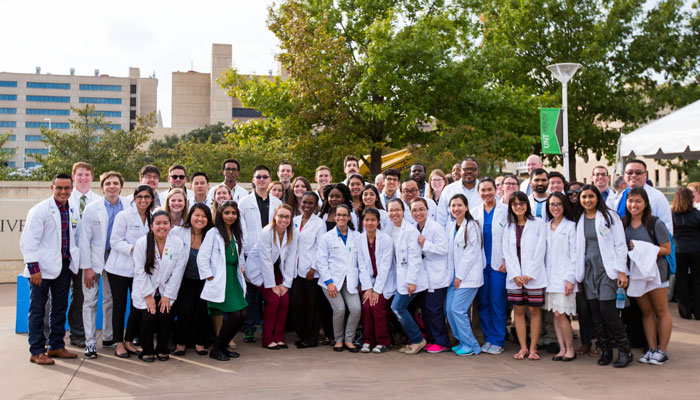Accreditation a milestone moment for College of Pharmacy
By Jeff Carlton
The College of Pharmacy at UNT Health Science Center has been accredited by the Accreditation Council for Pharmacy Education (ACPE), less than two months after graduating Fort Worth’s first class of pharmacy students.
The accreditation status is a milestone for the UNT System College of Pharmacy, which was founded in 2011, began classes in 2013 and graduated its first 68 students on May 20. The accreditation means the pharmacy program meets all 25 standards set by the ACPE regarding qualifications and education standards.
“This is a journey that’s taken several years, and the process is methodical and thorough,” said Charles Taylor, PharmD, Dean of the UNT System College of Pharmacy. “It’s incredibly exciting – and a testament to the quality of education our student pharmacists are receiving.”
Accreditation is designed to provide a national basis for quality assurance by ensuring that the education students receive leading to their doctor of pharmacy degree meets the standards of the profession. Programs are judged on both qualitative and quantitative measures.
The College of Pharmacy had been a candidate for accreditation as its first class made its way through the four-year program. Schools can only receive full accreditation after graduating an initial class of students.
The ACPE accredited the pharmacy college for two years, the maximum term available for new schools. In 2019, the college will be eligible for an eight-year term.
Prior to the college’s founding six years ago, there had long been a need for a pharmacy program in North Texas. There were pharmacy programs in Houston, Amarillo, Kingsville, Austin and San Antonio, but none to serve the North Texas community, which has 6.7 million residents, more than 22,000 hospital beds and nearly 600 community pharmacies.
The push for a pharmacy college gained momentum in 2011, thanks to strong support from leaders such as state Senator Jane Nelson, Chancellor Lee Jackson and Brint Ryan, now the Chairman of the UNT System Board of Regents.
Crucial support also came from teams across the Health Science Center, said Claire Peel, PhD, PT, Interim Provost.
“Thomas Yorio, Provost Emeritus, played a key role in working with state leaders to secure approval of the college,” Dr. Peel said. “Many thanks also go to founding Dean Myron Jacobson, Associate Dean Tina Machu, and every member of the System College of Pharmacy faculty and staff.”
Other teams that played a significant role in the accreditation process include the Office of the President, Division of Student Affairs, Center for Innovative Learning, Office of Interprofessional Education and Practice, Lewis Library, Facilities Management, and Office of Finance and Planning.
Since it opened, pharmacy faculty members have brought in more than $24 million in research funding, through programs looking at whether grapes can prevent cataracts, how to stem the epidemic of opioid abuse and whether better communication between pharmacists and physicians can improve outcomes for patients.
“The pharmacy school works with an extensive network of partners dedicated to helping people, families and our diverse communities live healthier, better lives through better medication choices,” Dr. Taylor said.
The college has designed affiliation agreements with community pharmacies – such as CVS Health, Walgreens, Tom Thumb, and Walmart – and pharmacies located in hospitals and health systems such as JPS Health Network, Medical City Healthcare, Baylor Scott & White, Methodist Health System and Texas Health Resources.
The college also works with its partners to pioneer new ways of integrating the pharmacists of the future into primary care health teams, researching more effective ways to use medicines and sharing knowledge about health conditions and medicines within the community.
“Our students spend more than a year embedded in pharmacy sites, and our scientists are discovering new drugs and figuring out how to make existing drugs better,” Dr. Taylor said. “There’s a strong foundation that’s been built here, and with accreditation, now we’re able to focus on what’s next.”







Social media